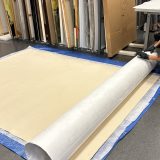Chapman University’s 2010- 2011 visiting
Fulbright Faculty Scholar, Binlan Huang, Ph.D, recently donated two pieces of batik art paintings to Wilkinson College of Humanities and Social Sciences.
 |
Left to right: Dr. Wenshan Jia, Dr. Binlan Huang
and Steve Harvath pose with batik painting gift. |
The two pieces of identical art are by an unknown local folk artist from the Zhuang ethnic minority, the biggest minority group in Guangxi Zhuang Autonomous Region in southwest of China. The background of the painting is the world famous Li River in Guilin City of Guangxi, and the picture shows the joyful daily life of the local Zhuang people along the river.
Wax resist dyeing technique in fabric is an ancient art form. It has been practiced by the ethnic Zhuang people since the Tang dynasty (618-907 CE). The traditional costumes of the Zhuang people are made up of decorative fabrics, which they achieve by pattern weaving and wax resist. They decorate hemp and cotton by applying hot wax then dipping the cloth in an indigo dye. The cloth is then used to clothe the human body, and its uses also include furnishing fabrics, heavy canvas wall hangings, tablecloths and household accessories. Batik techniques are used by famous artists to create batik paintings, which grace many homes and offices.
Dr. Huang is Professor of Pragmatics and Intercultural Communication at the College of International Studies, Guangxi University, People’s Republic of China. She received her Ph.D. at the University of Warwick, U.K., and has published on pragmatics, intercultural communication and foreign-language teaching methodology. Her Fulbright-funded research is intercultural communication.

